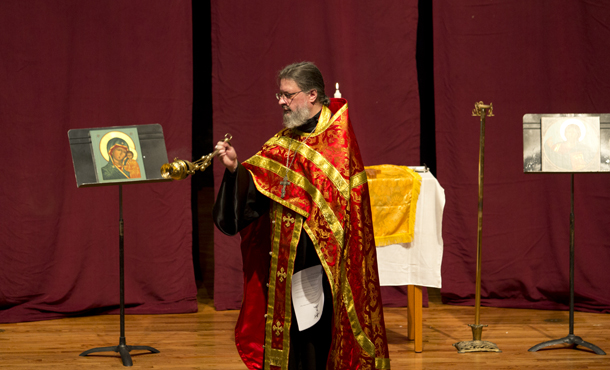“Religious Life” is the kind of topic one would expect Eastern Mennonite University to pick as its 2014 theme for International Education Week. It may surprise some, though, that this Christian university used the words “religious life” to refer to more faith perspectives than Christianity exclusively.
Then, again, this is a Christian university that says it is “like no other.”
The week was intended to encourage both interfaith dialogue and intercultural awareness, said Susannah Lepley, EMU’s director of multicultural and international student services.
Events included a lecture on Muslim prayer practices, a Bahá’í devotional, worship services conducted in the Orthodox, Mennonite, and Methodist traditions, a lecture on Jewish faith practices on death and dying, an interactive faith talkback, and an international food festival.
The week opened Friday, Sept. 12, with the Islam-themed talk, sponsored by EMU’s Center for Interfaith Engagement. “Religions are the most important part of our cultures,” said visiting Iranian-Islamic scholar Amir Akrami, at the beginning of his hour-long lecture about the history of Islam, basic Islamic beliefs, and what the ritual Islamic prayer practice (Salat) looks and sounds like.
Lectures, prayers, incense, music
Monday morning, a mostly different group of EMU community members gathered into a tight circle in the EMU Discipleship Center. The facilitator, senior Julie Huffer, welcomed the group and briefly explained how the Bahá’í devotional would run. Several participants were given yellow strips of paper containing portions of a single scriptural passage. Like Akrami, Huffer took time to explain the basic history and beliefs of Bahá’ís before moving into the main part of her program, which included hearing the words on the yellow strips, experiencing silence and prayer, and listening to music from a Bahá’í artist, before breaking for refreshments.
Rabbi Joe Blair’s explanation of Jewish practices on death and dying was both interesting and educational on Monday afternoon. “I learned that the Jewish tradition has a specific process of honoring the souls that have passed and honoring the family that has lost them,” said Huffer. “It was interesting because I didn’t know that in Judaism they have such a specific process.”
Held in Martin Chapel, both the Mennonite and Methodist worship services – Tuesday and Thursday, respectively – were sponsored by the EMU seminary, which is accredited by both denominations. They both included hymns, a short message on church history, and what a typical service looks like.
The thurible emitted a faint waft of incense as the priest swung it back and forth in front of the makeshift altar he was blessing in Lehman Auditorium on Wednesday. Although he later explained that his church, Church of the Holy Theotokos, was affiliated with a “simple” branch of Orthodox Christianity, the beautiful icons, heavy, ornately embroidered priest-robes, and formal blessing ceremony seemed mysterious and involved to eyes used to “plain” Mennonite worship practices.
Eye-opening for students
“It was eye-opening and refreshing to participate and experience another faith tradition,” said senior Philip Yoder, raised Mennonite. “I never realized they codified their faith tradition in the 10th century, and they have been worshiping the same way ever since. Even though the practices were old, they infused the service with heartfelt prayers for the students and professors at EMU, and that was pretty cool.”
On Thursday evening, around 50 people gathered in Common Grounds to view the Faces of EMU Exhibit and participate in an “interactive faith talk-back.” The evening included playing get-acquainted games, circulating through the exhibit, chatting, writing impressions on a large sheet of newsprint, and watching a short movie about the two largest minority groups on campus, Hindus and Muslims (from the series “Have a Little Faith” on the YouTube channel SoulPancake).
Senior Jordan Luther said “it was neat” to move beyond the Christian majority on campus and have his eyes opened to the religious minorities in the EMU community.
Popular food festival
By far, the most-attended event of the week was Friday’s International Food Fest and Games. This is perhaps to be expected since the time of the event did not conflict with classes or most work-study schedules, and the email reminder sent out by Lepley encouraged people to “bring your taste buds” to partake of enticingly described international foods.
Over 30 vendors prepared food that represented cultures in Saudi Arabia, Korea, Nepal, Kenya and Italy, among others. Students, faculty, staff and other community members intermingled together over what could be described as “a diverse fellowship of believers” or “interfaith communion.” With the Food Fest, the organizers of International Education Week showcased the different faith traditions present at EMU in a common space where everyone could laugh, break bread and celebrate their diversity.
The week was organized in conjunction with EMU’s International Student Organization, led by junior Kaltuma Hassan Noorow of Somali origin and senior Sun Ju Lee of South Korea; the Third Culture Kids Club, led by Carmen Witmer; the Center for Interfaith Engagement, represented by Trina Trotter Nussbaum; Cross Cultural Programs, represented by Linda Martin Burkholder, and Multicultural and International Student Services, led by Susannah Lepley.
